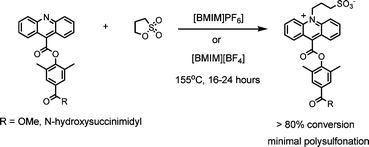Facile N-alkylation of acridineesters with 1,3-propane sultone in ionic liquids
Abstract
Hydrophilic chemiluminescent acridinium esters containing N-sulfopropyl groups are extremely useful

* Corresponding authors
a
Siemens Healthcare Diagnostics, Advanced Technology & Pre-Development, 333 Coney Street, East Walpole, MA, USA
E-mail:
anand.natrajan@siemens.com
Fax: 1-508-660-4591
Tel: 1-508-660-4582
Hydrophilic chemiluminescent acridinium esters containing N-sulfopropyl groups are extremely useful

 Please wait while we load your content...
Something went wrong. Try again?
Please wait while we load your content...
Something went wrong. Try again?
A. Natrajan and D. Wen, Green Chem., 2011, 13, 913 DOI: 10.1039/C0GC00758G
To request permission to reproduce material from this article, please go to the Copyright Clearance Center request page.
If you are an author contributing to an RSC publication, you do not need to request permission provided correct acknowledgement is given.
If you are the author of this article, you do not need to request permission to reproduce figures and diagrams provided correct acknowledgement is given. If you want to reproduce the whole article in a third-party publication (excluding your thesis/dissertation for which permission is not required) please go to the Copyright Clearance Center request page.
Read more about how to correctly acknowledge RSC content.
 Fetching data from CrossRef.
Fetching data from CrossRef.
This may take some time to load.
Loading related content
